“Que te pasa Clive? What’s up? We’re all worried about you. Are you depressed? Has your girlfriend left you?” The question was asked by Manolo, 55 years old and self-appointed class spokesperson, in the mid-class break in the coffee bar. I had been teaching the group of upper intermediate students (adults and young adults) for about a month. I had taught the same students three years previously when they were absolute beginners and the classes had been a great success. Now the same people (or at least a hard core of them) were with me again as upper intermediate students, and I had thought that things were going very well. I replied that I had rarely felt better so Manolo elaborated further: “It’s not the same as it used to be. We’ve all been saying it You’re much more serious than you used to, the book is more serious, the topics are serious, the talking is serious. The classes aren’t as enjoyable as they used to be. We never sing now.. or laugh much…. We’re just not enjoying it any more.”
Teaching more advanced students – why does everything change?
In my 23 years as a teacher, the most revealing moments have always come about through comments or criticisms made by my students. When I reflected on how Manolo and his class mates felt about their classes, I realised that, as usual, the students were quite right. For some reason when we move beyond intermediate level, the lively dynamic, interactive methodology that we use so successfully at the lower levels is abandoned and is replaced by an ‘advanced’ teaching style and teaching materials which are fundamentally dull. It is as if teachers (and text book writers) forget that our students are the same ones (or similar to those) that we taught at the lower levels. Simply by improving their level of English, they have not suddenly become drier, more intellectual, more sober people who now want their teacher and their classes to change from dynamic to deadly dull. For some reason, we stop bothering to engage our students with lively and interactive activities or to worry if the text or topic we plan to use will bore them rigid. If the text, vocabulary group or topic is ‘advanced’, then this seems to be sufficient justification for using it, irrespective of its inherent interest (or lack of it).
That brief conversation in the bar took place eight years ago, and it made me totally re-evaluate and change my approach to teaching advanced classes (upper intermediate and above).
All teaching should be serious and fun
It is important at this point to define my terms. When Manolo said ‘serious’, he was being kind - he meant dull. ‘Serious’ is something completely different and is what all teaching should be, whatever the level. In a nutshell:
Serious teaching =
- well-planned, well-organised, systematic, focused,
- presenting and revising new language thoroughly
- giving students a sense of progress
- challenging without overloading
Fun teaching =
- lively, engaging, interactive, pacey, humorous
- using texts and topics which are genuinely interesting
- exploiting competitive and co-operative games and activities
- using elements of mystery, suspense, surprise and humour to grab
and keep students’ attention
Dull teaching =
- boring, unengaging, dry,
- an over-emphasis on obscure, ‘advanced’ vocabulary
- getting students to read,write, listen and talk about topics which
are not inherently interesting
At higher levels, where progress is more difficult to perceive, it is vital that students feel their class is serious. But experience tells us too that a happy and lively class of learners is invariably a successful one. So here are a few practical tips for making sure your classes are serious, but fun too and never (or almost never) dull.
Choosing texts– the three golden rules
Before you use a text with a class ask yourself these questions:
1. Would this article interest and entertain my adult or teenage students
if it was in their own language? If not why am I making them read it in
English?
2. Is the text short enough to deal with in class? If a text is too
long, just reading it takes up valuable class time. If you set if for homework
nobody reads it or, even worse, half the students read it.
3. Will this text lead to speaking? Will the class react and respond
to it?
For example, a text about tropical hurricanes may be very interesting, but students are unlikely to have very much to contribute themselves. Have you ever experienced a hurricane? is likely to elicit the answer No. In contrast, a text about the psychological effect our name has on ourselves and other people is more likely to lead to real student input. Everyone has something to say here. Apparently ‘simple’ questions like What’s your name? Why were you called that? How do you feel about your name? Would you change it? can lead to genuinely interesting and fluent exchanges of opinions and anecdotes.
Exploiting a text – keeping things up your sleeve
The typical way of exploiting a text in class is the classic two phase, read for gist and then read for detail with everyone reading at their own pace. This is fine with some kinds of text, but not if the text has a strong story line or an element of suspense or mystery. In this case it may be better to deal with the text as a whole class activity, reading in lock-step, and stopping at different points to answer a question. Here is part of a true story about two friends whose amateur climbing expedition went horribly wrong. The text is used to provide a context for revising the third conditional and talking about personal attitudes to danger.

When students are guessing what’s going to happen, they are involved and engaged. Once students have taken their decision and the teacher has asked for some feedback, everyone reads on together. The end of the story is held back to the very end. If students had read the same text for gist/detail, the tension of the story could not have been exploited so successfully. Mystery is a magic ingredient in the language classroom.
Grammar exercises – they don’t have to be boring!
Higher level grammar exercises need to be serious, that is, focused and effective, but with a bit of thought they can be made just as fun and interactive as those designed for lower levels. Here is an example.
Any straightforward ‘put the verb into the correct tense’ can be transformed into an information gap exercise like this:
___________________________________________________________
Student A
1 If I’d known it was your birthday, I ________ (+)
2 I would have bought that jacket if it had been cheaper.
3 If she’d known he was married, she ________ (-)
___________________________________________________________
___________________________________________________________
Student B
1 If I’d known it was your birthday, I would have bought you a present.
2 I would have bought that jacket if it ________ (+).
3 If she’d known he was married, she wouldn’t have gone out with
him.
___________________________________________________________
Students, in pairs, take turns to guess each other’s sentences. Their partner helps them by giving feedback and clues, that is, it is a co-operative not competitive activity. It is much more fun and effective than a traditional exercise because students are engaged by the guessing element and will usually make several third conditional sentences before they guess their partner’s.
Writing – try to find a real reason for writing
Imagine you want to revise narrative tenses with your students and then to write a story using these tenses correctly. How can you motivate them to do this? Here is an idea that works well.
Every year the Daily Telegraph runs a ‘mini saga’ competition. Readers send in short stories which must be of exactly 50 words and must tell a story. Here is one of last year’s winners. The last word has been blanked for students to guess.
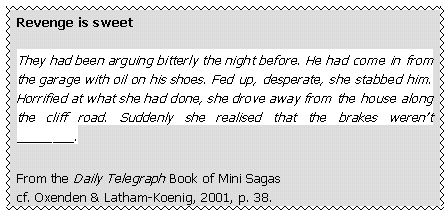
You can use the story to re-present and analyse the narrative tense verb forms before doing some controlled grammar practice. Once the tenses have been revised, students are ready to write their own mini saga and take part in a class mini saga competition. They should blank a word in the last line for others to guess. After you have corrected the stories they can be posted on the walls and the class choose the best story (ies). Here is one our students wrote.

Speaking – it doesn’t have to be dry and ‘intellectual’
Just because students are now advanced learners, it does not mean speaking topics have to become dry and quasi intellectual. In our experience a question (taken from an advanced textbook) like Do you think that a cure for AIDS will be found in the near future? will not lead to a great deal of animated conversation. Questions which are nearer to students’ own experience are invariably more successful e.g. Why can men never find things in the fridge or in a wardrobe? or Who is the biggest hypochondriac in your family?
At this level role plays can be very productive as students now have the confidence and fluency to ‘get into’ a role. In our experience they work best when students are given a clearly defined role, when there is an information gap (i.e. they don’t know what information their partner has been given), and when the role play is light hearted or humorous. A role play we have used successfully involves a series of patient/doctor conversations and where students put medical vocabulary into practice without being forced to talk about real life medical problems like their grandmother’s hip operation.
A You are a family doctor. The person who has just come into the surgery is B, a patient you’ve seen a couple of times before. You think B may be a hypochondriac. Find out what his/her problems are (symptoms, etc.) and ask about his/her general health (e.g. diet, sleeping, smoking, exercise, stress). If you think B is really ill prescribe some medicine. If you think that B is a hypochondriac don’t say anything but don’t give him/her a prescription.
B You are a patient. A is your family doctor. You haven’t been feeling very well recently (What are your symptoms?). You think you need to have a full check-up (x-ray, blood test, etc.) You think you need to see a specialist and to have some medicine. You have your own ideas about what is wrong with you (what?). Make sure the doctor takes your problems seriously and make sure you get what you want.
Listening - Don’t forget pop songs, but go easy on the tippex.
At advanced levels songs, along with other lively and motivating activities
often seem to get thrown out of the window. The motivational value to students
of listening to and understanding pop songs is well known, and a song can
add an enjoyable dimension to a topic area or grammatical point being studied.
We teachers usually like to exploit a song for listening comprehension,
but have a tendency to tippex the lyrics to death. Blank filling individual
words is notoriously more difficult and time consuming than we anticipate.
Listening to the song at home on our hi fi system is not the same
as students struggling against bad classroom acoustics and a tiny cassette
player. Many pop song lyrics defy even native speaker abilities to decipher
them and the task can never be too easy. Here are some fun and effective
alternatives to straight gap fills. The first two ideas again exploit the
elements of mystery and guesswork.
a) Give a clue to make the task more accessible. Students can predict before they listen.
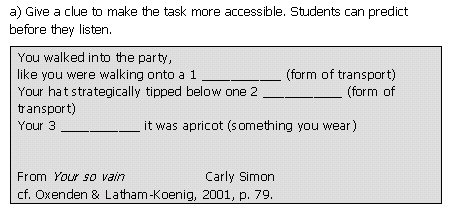
b) Change some of the words in the song. Students listen and circle the bolded word if it has been changed.
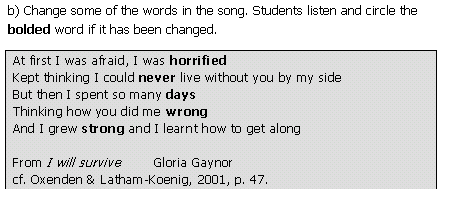
c) Students use the song’s rhyme to guess the blanked words (first letter given). Then they listen to the song to check their guesses.
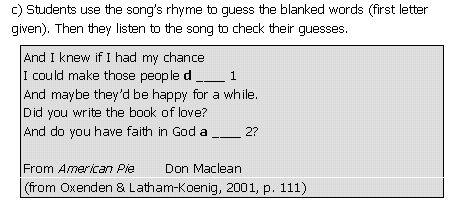
Jokes and anecdotes - laughter is relaxing
A true anecdote or piece of information or well chosen joke can offer another dimension to a topic in class and a students who are smiling or laughing are usually focused on the lesson. Here are two examples which helped to enliven the topic of male/female gender differences.


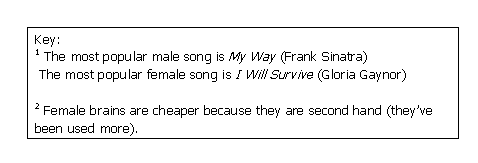
Conclusion
All teaching should be serious (well organised and professional),
whatever the level, but students everywhere, whether they are beginners
or advanced, respond better and learn better when they are involved, engaged
amused, challenged and surprised. In other words, when their classes are
fun.
Notes
1 This paper
is a written version of the plenary talk given at the 11th IATEFL-Hungary
Conference at Nyíregyháza, October 7, 2001.(back)
References
Oxenden, C., & Latham-Koenig, C. (2001). English File Upper-intermediate. Student’s Book. Oxford: Oxford University Press.
Clive Oxenden teaches at the British Council Valencia, Spain. Together with Christina Latham-Koenig
he is the author of English File Upper-intermediate.